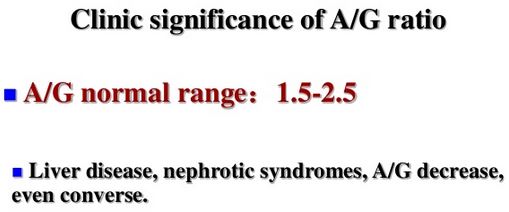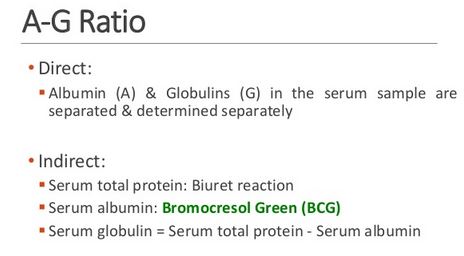A/G Ratio
What is A/G Ratio?
Globulin and albumin are important proteins found in your blood. Albumin is manufactured in the liver and its main functions include: It helps to transport molecules in the blood and it ensures that blood does not drip into the body tissues3.
Globulin on the other hand is produced in the liver and immune system. It protects the body against infection and moves nutrients around the body. Globulin can be grouped into the following: gamma, alpha and beta according to how molecules move via a gel under the influence of electric current.
Gamma globulin is manufactured in the immune system and most of them are immunoglobulins. These immunoglobulins are named as follows: lgA, lgG and lgM component.
Alpha globulin is produced in the liver and there are alpha 1 and alpha 2 globulins. Their functions include: inhibits enzymes responsible for breaking down proteins. Beta globulins are also produced in the liver and they are grouped into beta 1 and beta 2 globulins.
Beta globulins examples are proteins that combine iron in the body and a form of immunoglobulin antibody called IgM. Beta and alpha globulin act as enzymes and moves proteins around the body while gamma globulin acts as antibodies that protect the body against infection4.
Albumin/globulin refers to the quantity of albumin in the blood compared to amount of globulin in the blood. To get a/g ratio, you divide the value of the amount of albumin with globulin value. This ratio is used to assess the function of the liver and other problems such as kidney diseases.

Serum Protein Test
This test determines all proteins in your blood. It can also be used to determine the amount of globulin and albumin in the blood and make a comparison to compute a/g ratio. When you have an injury, open wound or sick, your albumin level in the blood becomes low 4
Importance of Serum Protein Test
As we eat proteins from the food, the liver converts them into other new forms of proteins which are circulated throughout the body. This test is conducted to find out if your liver is working properly.
Your doctor may suspect you have liver diseases by examining the following symptoms:
Your eyes and skin are yellow, a condition known as jaundice. There are noticeable swellings around your legs, stomach and eyes. You feel weak or fatigued easily. You suddenly lose weight.
Serum albumin test can also reveal presence of other diseases such as kidney diseases and chronic pancreatitis. This test will confirm whether these conditions are getting worse or improving.

Procedure of Serum Protein Test
Before performing this test, there some considerations you have to follow according to your doctor. You should tell your health professional any medicines you have been using because they tend to lower the amount of protein in your blood and this may affect the test results.
Medicines such as insulin and growth hormones can affect the test results. Also if you have been using any form of vitamins or herbs inform your health professional. In addition, drink plenty of water because when you are dehydrated, the test results may be affected.
Serum protein test is conducted on the sample of your blood. Your health professional cleans the area where blood will be taken with an antiseptic wipe or alcohol swab. A rubber band is the tied around your upper arm to cause the veins there to swell with blood. This is done to assist in locating the vein easily.
Once the vein is located, your health provider pierces a needle which is fixed to a vial to draw blood from the vein. The sample of blood is then taken to the laboratory for analysis.

Interpretation of Serum protein Test Results
The results depend on the type of laboratory used to analyze the blood sample and type of measurement. Your health professional considers your previous laboratory test and your health to interpret these results. The following are the results and interpretations of serum protein test2
Low level of total protein
When the results of the test show that you have low protein level in your blood, it shows that you may have the following medical conditions:
- Liver and kidney disease.
- Digestive disorder such as celiac disease. This is a condition where there is a problem with a digestive protein called gluten, which affects proteins you eat from food not to be properly absorbed.
- It may also indicate malnutrion; a person may have insufficient protein which is not absorbed into the body.
Low level albumin/globulin ratio
It shows the following:
- You have medical condition that causes globulin to be produced in excess. These conditions include lupus, an autoimmune disease that occurs when the immune system produces excess antibodies that attack healthy cells and tissues.
- You have other medical condition that causes albumin to be produced in small quantities or its total loss. These conditions include liver cirrhosis and nephrotic syndrome.
A high level of total protein
When the test results shows that you have a high level of total protein in the blood, it may indicate that you have the following medical conditions:
- Liver related diseases and kidney problems
- Inflammation or infections such as HIV or Hepatitis.
- Disorders of the bone marrow such as multiple myeloma.
High level albumin/globulin ratio
It shows that:
You have medical condition that causes globulin to be produced in small quantities. These conditions include hypothyroidism (this is a condition where the body has insufficient thyroid hormone), leukemia and some genetic disorders.
Other tests are required to comprehensively confirm diagnosis of several medical conditions suspected to be present during the lab tests. Your health professional would give results after considering all possible tests. One of the tests your doctor may conduct is microalbuminuria test if you are suspected to have a damaged kidney1.
In this test, urine samples are taken as directed by the doctor and analyzed to determine if albumin are present in the urine. This test is done together with a creatinine test to give an albumin- creatinine ratio. Creatinine is an unwanted material in the blood. When there are problems with your kidney, creatinine level in the urine would be low as compared to albumin.
Reference List
- Microalbuminuria test. http://www.healthline.com/health/microalbuminuria-test#overview1
- Serum protein test. http://www.webmd.com/a-to-z-guides/what-is-a-total-serum-protein-test#2
- Serum protein test. http://www.dovemed.com/common-procedures/procedures-laboratory/total-serum-protein-with-albuminglobulin-ratio/
- Albumin/Globulin ratio. http://effectivediagnosis.org/albuminglobulin-ratio/
- Serum albumin test. http://www.healthline.com/health/albumin-serum#overview1






